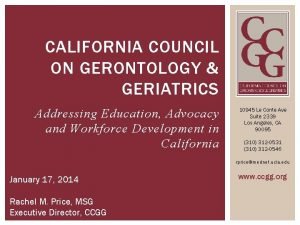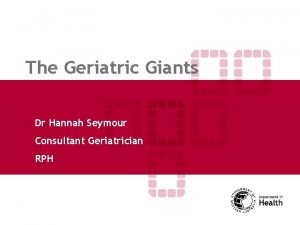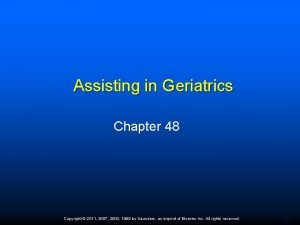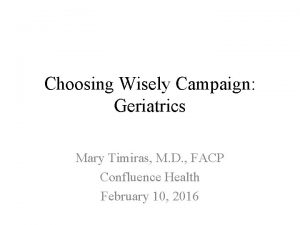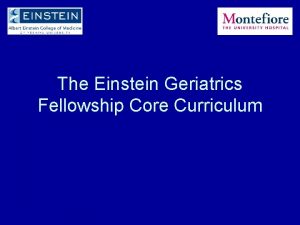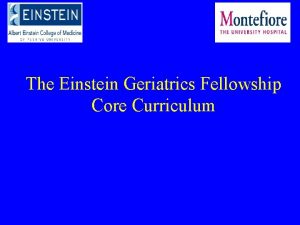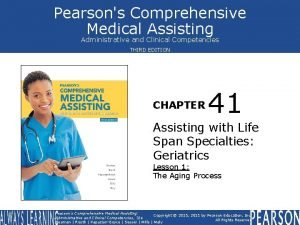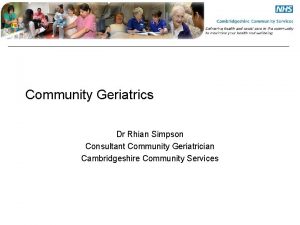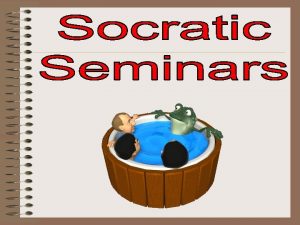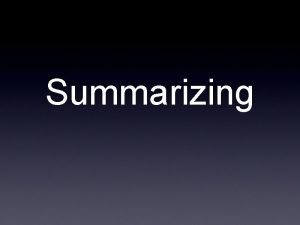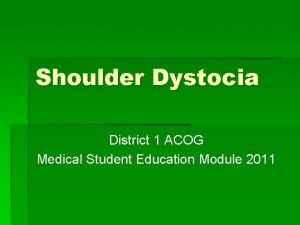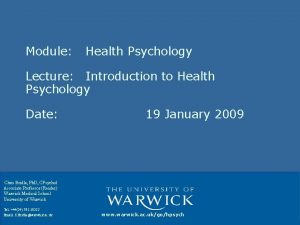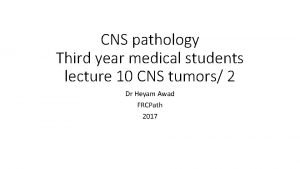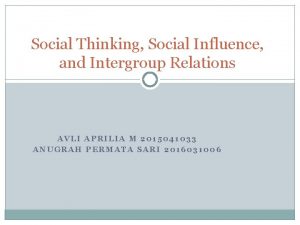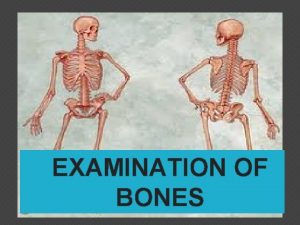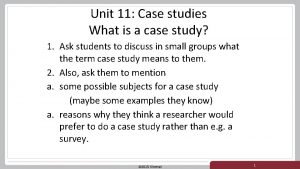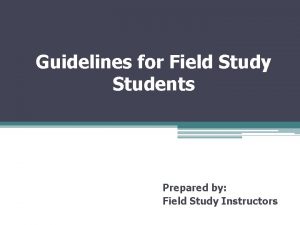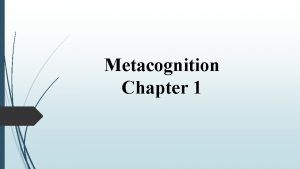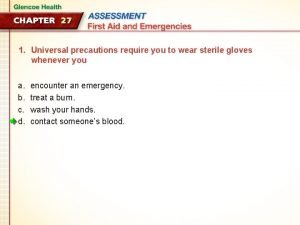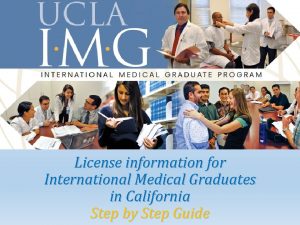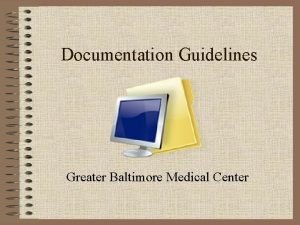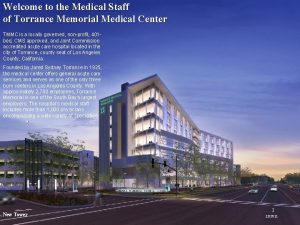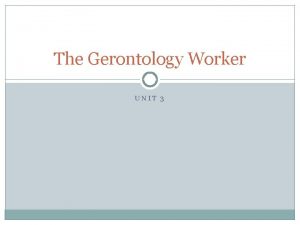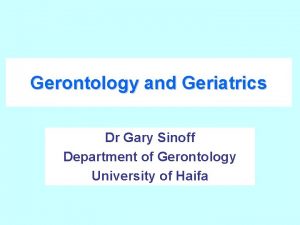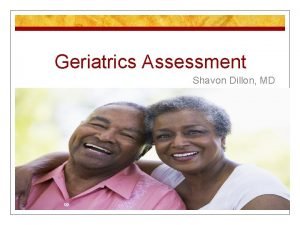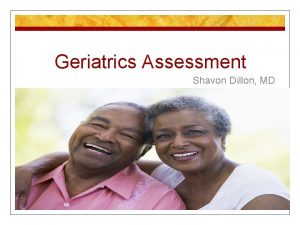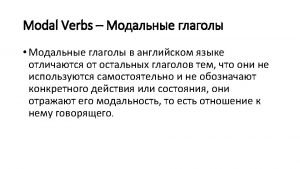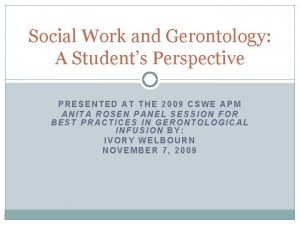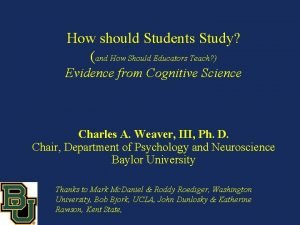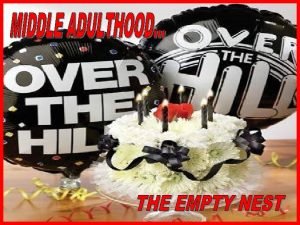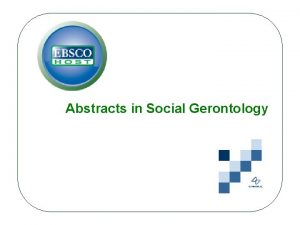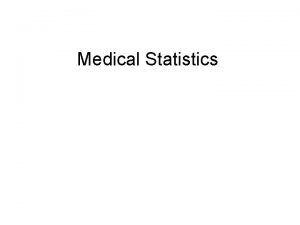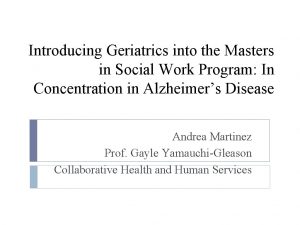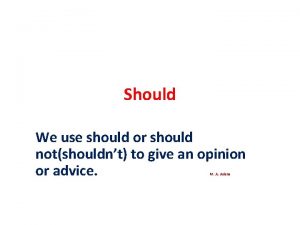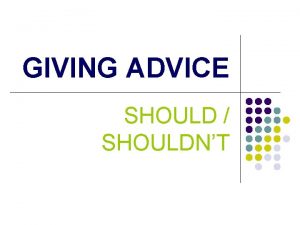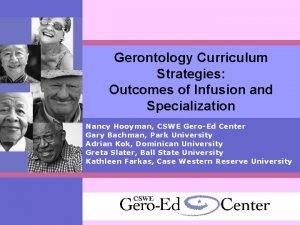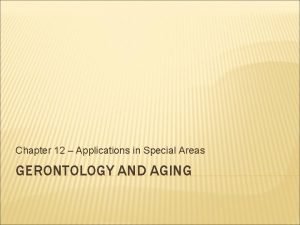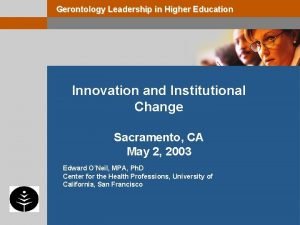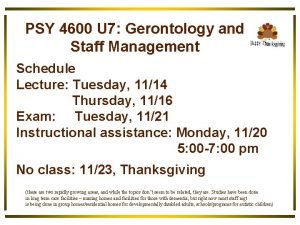Should medical students study Social Gerontology Geriatrics and


























- Slides: 26

Should medical students study Social Gerontology? Geriatrics and Gerontological Nursing conference 4. 10. 16 Anthea Tinker, Labib Hussain, Jack Lilly d’Cruz, William Tai Yee Seng, Sebastian Zaidman, King’s College London

Outline 1. Origins of this presentation and reactions to the findings 2. Background 3. Teaching on Gerontology in Medical Schools – 3 a. Clinical Geriatrics – 3 b. Social Gerontology 4. Why Social Gerontology? 5. What subjects are most relevant to Social Gerontology? – – 5 a. Demography 5 b. Sociology of Ageing 5 c. Psychology of Ageing 5 d. Social Policy 6. Our conclusion 7. The response to our paper

1. Origins of this presentation Professor Anthea Tinker is Professor of Social Gerontology at King’s College London and is personal tutor to the Intercalated medical students taking the BSc Gerontology. Each year she works with the students to give a conference presentation and a publication. The 2014 – 2015 were enthusiastic about this and they all collaborated in their own time (this is not an official part of the course) to produce a presentation to the British Society of Gerontology conference in Newcastle in 2015. They had a good response to this and wrote an article. This was published by Age and Ageing in 2016 (vol. 45, pp. 190 – 192). 3

1. Reactions to the findings The response to the article was an Editorial and this was published by Age and Ageing in 2016 (vol. 45, pp. 188 – 189). This was by Professor Adam Gordon, Professor Adrian Blundell, Professor John Gladman and Professor Tahir Masud. Our article was considered by the authors of the Editorial to be ‘impassioned and well-argued’. The response of these commentators to our article is discussed at the end of our presentation 4

2. Background on Medical School Curricula • General Medical School (GMC) Guidance – Tomorrow’s Doctors (2009) • Generic Guidance • Lack of individual specialties • Scope for variability

2. Background on Medical School Curricula • British Geriatrics Society (BGS) – 11 Learning Outcomes mapped to ‘Tomorrow’s Doctors’ • Attitudes / Skills / Core Competencies • Ageing and Health

3. Teaching on Gerontology in Medical Schools – a. Clinical Geriatrics • British Geriatrics Society: Learning Outcomes – 3 a. describe the contributions of the following professions allied to medicine: Occupational therapy, Physiotherapy, Nurses, Dieticians, Speech & language therapists, Social workers – 3 f. Describe/define the diagnosis, pathophysiology, management and preventative strategies for specific disease processes: dementia, delirium, depression, continence, osteoporosis, falls, parkinsonism & movement disorders, pressure ulcers, cerebrovascular disease and stroke – 8 c. describe the process of Comprehensive Geriatric Assessment, including initial assessment, establishment of a problem list, management plan, goals and iteration. Describe the role of the multidisciplinary team in this process.

3. Teaching on Gerontology in Medical Schools – a. Clinical Geriatrics • Comprehensive Geriatric Assessment (CGA) – Evidence Based Medicine • Older People with Frailty – Multidisciplinary & Iterative Approach • Provision of Care – Many Aspects • E. g. Heterogeneity of Older People

3. Teaching on Gerontology in Medical Schools – b. Social Gerontology • BGS Guidelines 2013 – Learning Outcome 1 : recognising the ‘myths and stereotypes related to older people’ and the ‘heterogeneity of older persons’. – Learning Outcome 9 : demography, the relationship between health and social care provision for older people and the psychosocial theories of ageing. • European curriculum (Masud et al 2014) 9

3. Teaching on Gerontology in Medical Schools – b. Social Gerontology • Taught throughout medical school as per BGS guidelines • Pre-clinical lectures covering the subtopics discussed • 4 week Geriatric clinical placement to reinforce preclinical teaching • Variety of assessment formats 10

3. Teaching on Gerontology in Medical Schools: Summary • Need for combination – Geriatric Physician – Social Gerontologist

4. Why Social Gerontology? • 26% of UK medical students not exposed • Gordon et al. 2014 • Reasons embedded within the sub-topics of: a. Demography b. Sociology of Ageing c. Psychology of Ageing d. Social Policy

5. What subjects are most relevant in Social Gerontology? Probably all but we now identify 4 as being crucial 13

5 a. Demography • Valuable introduction and reminder of population ageing • AND • …its impact on the doctors of tomorrow

5 b. Sociology of Ageing • Highlight heterogeneity among older people • Challenge negative stereotypes and ageist attitudes • Life course perspective – a reminder for: • - Thorough medical history • - Temporal consideration – appreciate worth

5 c. Psychology of Ageing • Differentiate normal vs. pathological ageing – cognition, intellect and personality • First-hand lived experiences e. g. dementia • Coping strategies and resilience • Health-seeking behaviours

5 d. Social Policy • Clinician involvement in policies • Better aware of best practice measures • Better aware of financial and political state of working environment • Adds to life-long learning mantra: policies

6. Our conclusion • Increased knowledge base • Challenge ageist attitudes and any pre-existing stereotypes • Philp 2006 – National Service Framework • Improved attitudes towards older patients • Tullo et al. 2010 • Better empathy, relationship, communication and person-centred approach in practice • Burley 1981

6. Our conclusion • British Geriatrics Society guidance should be closely followed • Need for better universal pre-clinical coverage of Social Gerontology – Ensured presence in clinical blocks • More programmes such as the Intercalated BSc Gerontology at King’s College London 19

7. The response to our paper It said that our arguments must take into account: - ‘not enough space’ – it is impossible to accommodate all desirable information in the medical curriculum. The response to this must be to work out a way in via numerous means such as multidisciplinary teaching 20

7. The response to our paper It said that our arguments must take into account: - ‘not enough evidence’ – ‘there is need for more evidence that more and better teaching about older people and ageing can substantially and positively influence attitudes and behaviours of the medical profession in a meaningful way’ 21

7. The response to our paper It said that our arguments must take into account: - ‘disciplinary territorialism’. For example psychology may or not be considered as part of Social Gerontology. In addition there are other disciplines which it could equally be argued should be part of the syllabus such as architecture and design 22

7. The response to our paper There were 4 key points in the article: 1. ‘Training in the full breadth of gerontological disciplines is important to appropriately equip doctors for practice’ 2. ‘The amount of teaching currently delivered to medical undergraduates in these areas is inadequate’ 23

7. The response to our paper There were 4 key points in the article: 3. ‘Gerontologists must be aware of the time pressures on modern medical education in making innovative cases for inclusion’. 4. ‘It is important to conduct research alongside innovative teaching in gerontology to evaluate its impact on doctors’ knowledge, behaviours and attitudes’. 24

References • • • British Geriatrics Society. 2013. British Geriatrics Society Recommended Curriculum in Geriatric Medicine for Medical Undergraduates, 2013. Available At: www. bgs. org. uk/index. php/general-information-171/306 undergraduatecurriculum. [Accessed: 17 th June 2015]. Burley, D. 1981, ‘What every medical student should know about Social Gerontology’, Gerontology & Geriatrics Education, 2. 1(1981), pp. 15 -18. Gordon, A. L. , Blundell, A. , Dhesi, J. K. , Forrester-Paton, C. , Forrester-Paton, J. , Mitchell, H. K. , Bracewell, N. , Mjojo, J. , Masud, T. , Gladman, J. R. F 2014, ‘UK medical teaching about ageing is improving but there is still work to be done: the Second National Survey of Undergraduate Teaching in Ageing and Geriatric Medicine’, Age and Ageing, vol. 43(2), pp. 293 -297. Masud, T. A. , Blundell, A. L. , Gordon, Mulpeter, K. , Roller, R. , Singler, K. , Goeldlin, A. , Stuck, A. 2014, "European undergraduate curriculum in geriatric medicine developed using an international modified Delphi technique. " Age and ageing (2014): afu 019. Philp 2006, A New Ambition for Old Age: Next Steps in Implementing the National Service Framework for Older People [pdf] London. Available At: http: //library. nhsggc. org. uk/media. Assets/dementiasp/A_new_ambition_for_old_age_12 -Nov-07. pdf. [Accessed: 17 th June 2015]. Tullo, E. , Spencer, J. , Allan, L 2010, ‘Helping the young to understand the old. Teaching Interventions in Geriatrics to improve the knowledge, skills and attitudes of undergraduate medical students’, Journal of the American Geriatrics Society, 58(2010, pp. 1987 -1993. 25

Questions and comments welcome Thank you for listening 26
 California council on gerontology and geriatrics
California council on gerontology and geriatrics Giants of geriatrics
Giants of geriatrics Chapter 41 assisting in geriatrics
Chapter 41 assisting in geriatrics Choosing wisely geriatrics
Choosing wisely geriatrics Einstein geriatrics
Einstein geriatrics Einstein geriatrics
Einstein geriatrics Chapter 41 assisting in geriatrics
Chapter 41 assisting in geriatrics Rhian simpson
Rhian simpson Why was rizal called the champion of filipino students?
Why was rizal called the champion of filipino students? Socrates believed that students should
Socrates believed that students should Should students be
Should students be One of the toughest parts of summarizing is
One of the toughest parts of summarizing is Helper in shoulder dystocia
Helper in shoulder dystocia Definition of health psychology
Definition of health psychology Pathology lectures for medical students
Pathology lectures for medical students Social thinking social influence social relations
Social thinking social influence social relations Social thinking social influence social relations
Social thinking social influence social relations Hepburn osteometric board
Hepburn osteometric board Case study questions for students
Case study questions for students Portfolio in field study
Portfolio in field study It includes how one views himself as a learner and thinker
It includes how one views himself as a learner and thinker You should always seek professional medical care for
You should always seek professional medical care for Should marijuana be a medical option
Should marijuana be a medical option Sam and verna coursework answers
Sam and verna coursework answers California medical license application
California medical license application Gbmc medical records
Gbmc medical records Torrance memorial map
Torrance memorial map
